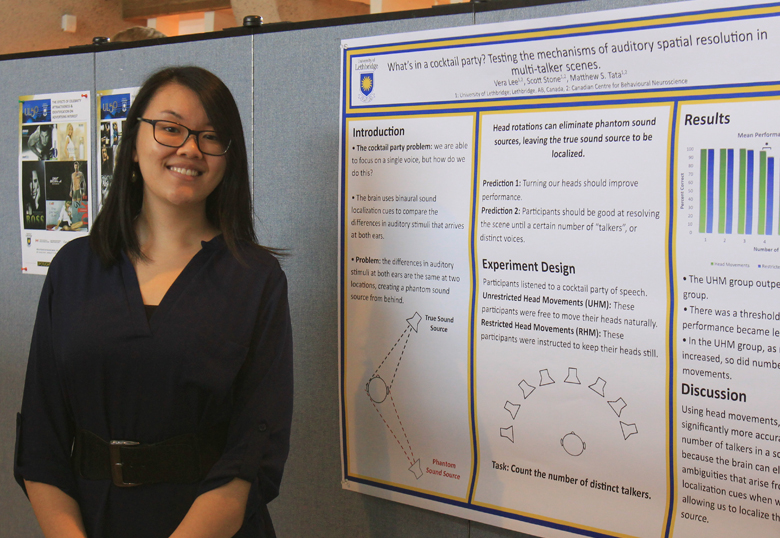How a star is born could be the subject of a Hollywood movie but for Geoffrey Sitwell, a master’s student at the University of Lethbridge, it’s a subject for intense research.
He was one of more than 40 undergraduate students who participated in the Undergraduate Research Showcase poster session held as part of Research Week.

Working under physics professor Dr. Locke Spencer, Sitwell, then an undergraduate, used observations from the Herschel space telescope and studied the infrared wavelength, which is beyond the visible spectrum.
“What I’ve been looking at are massive clouds of cold dust and gas that are going to collapse into stars,” he says. “They’re kind of nurseries of the stars or infant stars.”
The spectral analysis tells Sitwell the types of molecules that are present in the clouds and further analysis provides measures of temperature, density and distribution of matter.
“By taking the temperature and densities of dust and looking at the temperatures and densities of gas and combining these together we can form rudimentary models of what these stars look like in their infantile stages,” he says. “The ultimate goal is to use this to inform star formation theory because we still don’t actually know how stars are formed.”
Sitwell has found that conducting research has given him significant benefits and paved the way for his studies as a graduate student.
“It’s been a wonderful experience working here and I’ve gotten the chance to collaborate with scientists from NASA and all over the world,” says Sitwell. “For me, doing the research was really what grounded most of my studies and motivated me to learn more because you’re finally tying it into something real, rather than constantly working with abstractions and math. The theory we learn in lecture is grounded by the research applications.”

Beke finds research work exciting and, in addition to taking two independent study courses with a research component, she’ll be working in Dr. Gonzalez’s lab over the summer.
“Research is one of the reasons I come to school. Sometimes I want to be in the lab more than I want to be in class,” she says.
Vera Lee, a fourth-year student studying math, neuroscience and psychology, has worked with Dr. Matthew Tata, a neuroscience professor, conducting research into how people are able to hear in a cocktail party setting.
“That’s when you’re in a crowded room and you have a bunch of people talking. We have this ability to focus on a single conversation and filter out all the background noise. We can do this but we really don’t know how we do it,” she says.
Lee looked at the ways people can localize where a sound is coming from. Lee tested people’s ability to localize sound when they turned their head and when their head was stationary.

Lee says conducting research as an undergraduate has changed her post-secondary education path. Her original goal was to pursue a degree in education.
“Now that I’ve been exposed to this opportunity and I’ve been able to do this research, I want to take my master’s,” she says.
